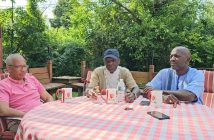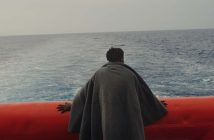Shot in video, in the style a news report, the film begins with the arrival of refugees in a UN camp. But very quickly, the camera becomes more fictional as it focuses on the life of a small clan, a brotherhood. The fact is that if Little John has this news report value, its intentions go beyond a specific situation. No time or place is mentioned by the way: the real story is the violence individuals internalize in times of war. The type of violence that messes up, haunts, obsesses and erases all structure and culture. The type of violence that brings more violence, crime, and the rejection of self. Girls are becoming prostitutes, boys are pointing guns at people.
Nevertheless, all of them still respect their grandmother with whom they engage in a hide and seek game imbued with humor. Her authority is safe even if everything is happening behind her back. The seedy character of Uncle Youl (who, on screen, disappears in clouds of smoke), – honest during the day, deceitful at night -, is here to remind us that adults are the ones making war and using children for their own ends.
What is the point of bringing back such obvious questions? Because it is still very current in this day and age to deconstruct conflicts. Because it is important in a world that has lost its marks, to look with humanism at the « déshumanisation » resulting in the violence which has stained for more than ten years the area from where Cheick Fantamady Camara is and other regions in Africa and in the world.
No need to thrust forward great arguments, rather have a few individuals stand out in the midst of the televised images of refugees camps, eager to live their youth but bearing on their shoulders the weight of their displacement, of the world drifting, of the loss of their close relations.
And let them live, laugh, speak, dare, search and lose themselves. It’s like a Nicolas Ray’s short, or like Rebel Without A Cause, with, as a new addition, the lust for quick money, all in all, a very current issue.
If Cheick Fantamady Camara’s second short film makes you really feel that the world is weighing you down, it’s because it bears the great mark of a film director – a mark already perceptible in his first short, Konorofili. He masters everything: the narrative benefits from the choice of cameras, sends a thrill of multiple shots, resonates with the gun shots as much as with the characters’jokes and most of all, like in Konorofili, takes shape through the subtle way in which Camara catches and directs motion, the expressive movements of his actors or of the camera that he uses exempting his shot from lingering. For here nothing stays still. Everything follows the tragic rhythm of these young people made in the image of the Conakry gangs (cf. Mathias, Le procès des gangs by Gahité Fofana and Kiti, Justice en Guinée by David Achkar) adamant in their teenage recklessness and a miniature version of the world, blowing up because they cannot live and killing themselves softly.
///Article N° : 5722








